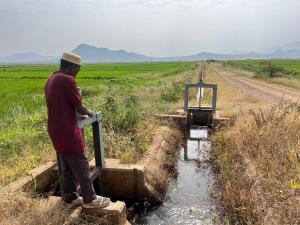Test project Pesticides and Protection Tanzania
testing out building a project
Omar Pérez: Submarine Roots, Resisting (un)natural disasters
omarperezI am interested in seeing how social ties and networks have been used to cope with (un)natural disasters. My research focus on places under disasters conditions such as Puerto Rico after hurricane Maria, in which social ties have made the difference between life and death. Furthermore, “natural” disaster has been used to approved austerity measures and unjust policies to impoverished communities like in New Orleans after Katrina. These policies were not new, as they are rooted in structures of power to preserve the status quo. Yet, people have resisted, “through a network of branches, cultures, and geographies” that has stimulated a reflective process of looking within for solutions rather than outside. As often this outside solutions are not only detached from community’s reality but can perpetuate social injustices and inequalities.
McKittrick, K., & Woods, C. A. (Eds.). (2007). Black geographies and the politics of place. South End Press.
Bullard, R. D., & Wright, B. (Eds.). (2009). Race, place, and environmental justice after Hurricane Katrina: Struggles to reclaim, rebuild, and revitalize New Orleans and the Gulf Coast. Westview Press.
Environmental Justice framing implications in the EIS

The Environmental Impact Statement (EIS) is a document required by the National Environmental Policy Act
Annotated Bibliography (EIS)
This link complements the Essay Bibliography of the Project Environmental Justice framing implications in the EIS.
Environmental Justice Framing Implications in the EIS. Essay Bibliography
This is the PECE essay bibliography for:
EPA Database on EISs
This (EIS) database provides information about EISs provided by federal agencies, and EPA's comments concerning the EIS process.
pece_annotation_1477258748
tamar.rogoszinskiEmily Goldmann, PhD, MPH, is an Assistant Research Professor of Global Public Health at the College of Global Public Health. Her work focuses on social and environmental determinants of mental health conditions such as posttraumatic stress disorder and depression, as well as the mental health consequences of acute health events. She believes that context is important when thinking about mental health conditions and that the causes of mental illnesses are embedded in all aspects of life. She has also worked as an epidemiologist at the NYC Dept of Health and Mental Hygiene in the Bureau of Adult Mental Health following Hurricane Sandy.
Sandro Galea, MD, MPH, DrPH is a physician and epidemiologist. He is the Robert A. Knox Professor and Dean at the Boston University School of Public Health. He has served as the Anna Cheskis Gelman and Murray Charles Gelman Professor and Chair of the Department of Epidemiology at the Columbia University Mailman School of Public Health. He has also held leadership positions at the University of Michigan and at the New York Academy of Medicine. His interests lie in the social production of health of urban populations, with a focus on the causes of brain disorders such as mood-anxiety disorders and substance abuse. He also works on the consequences of mass trauma worldwide. He has published over 600 scientific journal articles, 50 chapters, and 10 books and has received funding from NIH and CDC. His medical degree is from the University of Toronto, and his graduate degrees are from Harvard and Columbia with an honorary doctorate from the University of Glasgow. He has held several prestigous leadership positions.
pece_annotation_1477962256
tamar.rogoszinskiThe system relies on its developers, as mentioned, for support and information. They are also responsible with creating updated versions in order to provide better functionality, but also keep the information up-to-date and accurate.



the rice irrigation scheme, Pare Valley, Tanzania